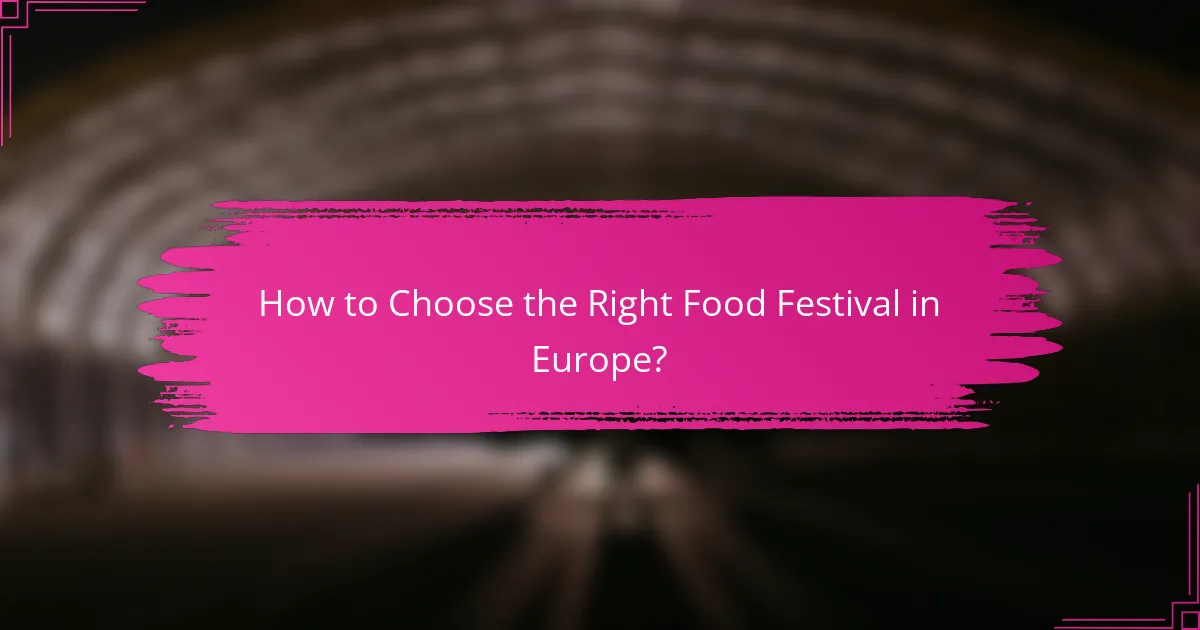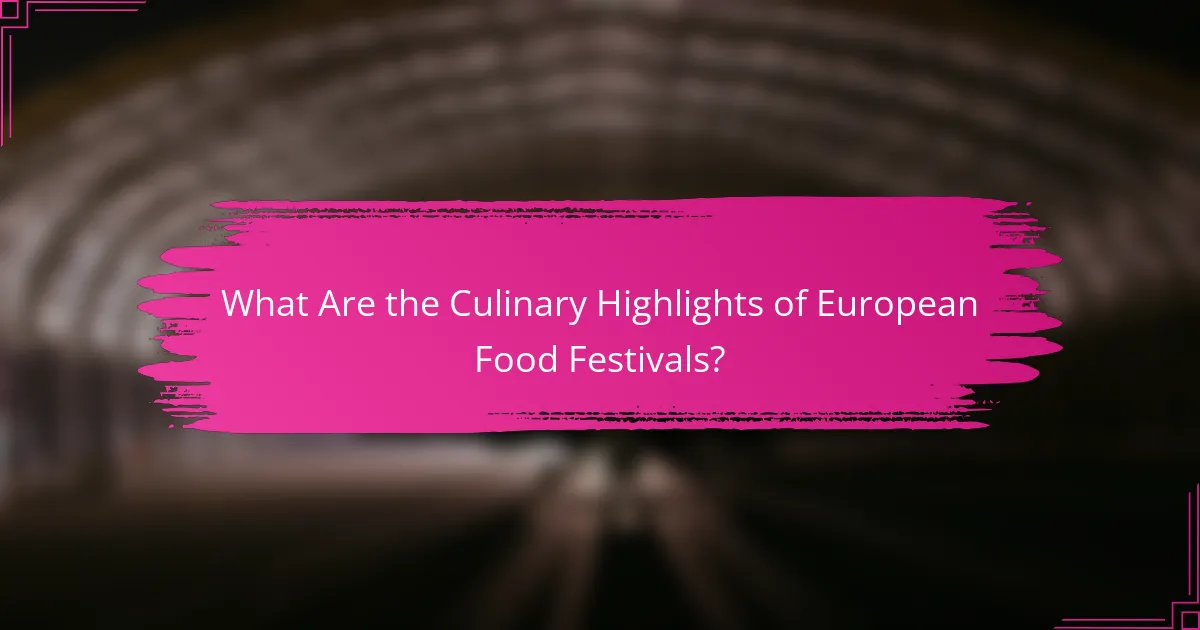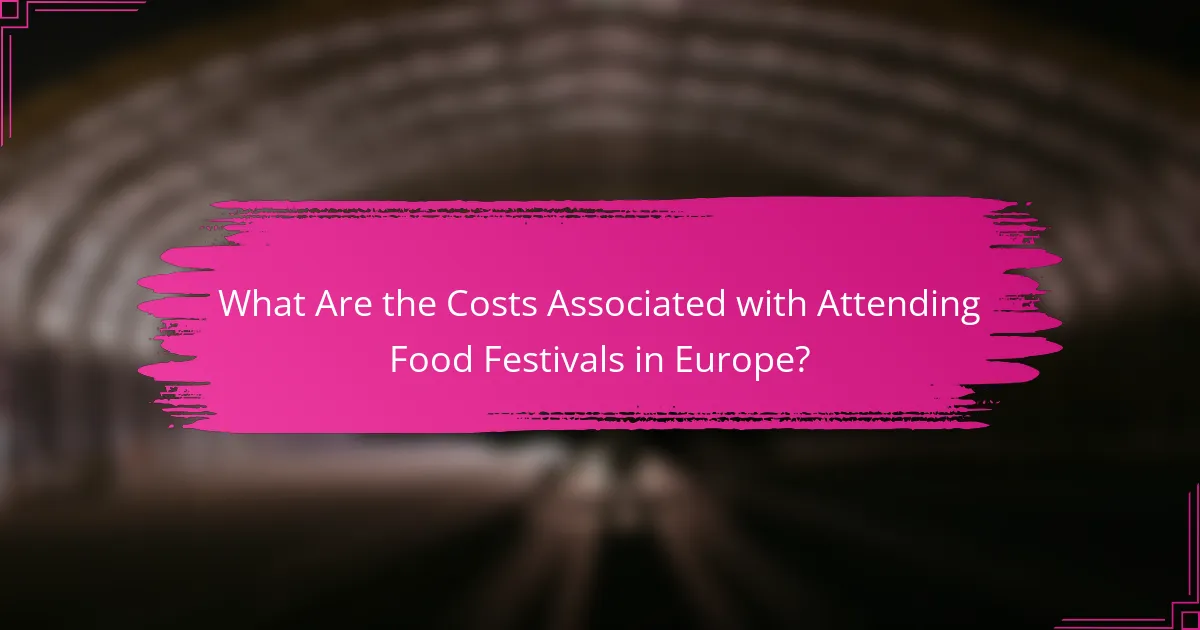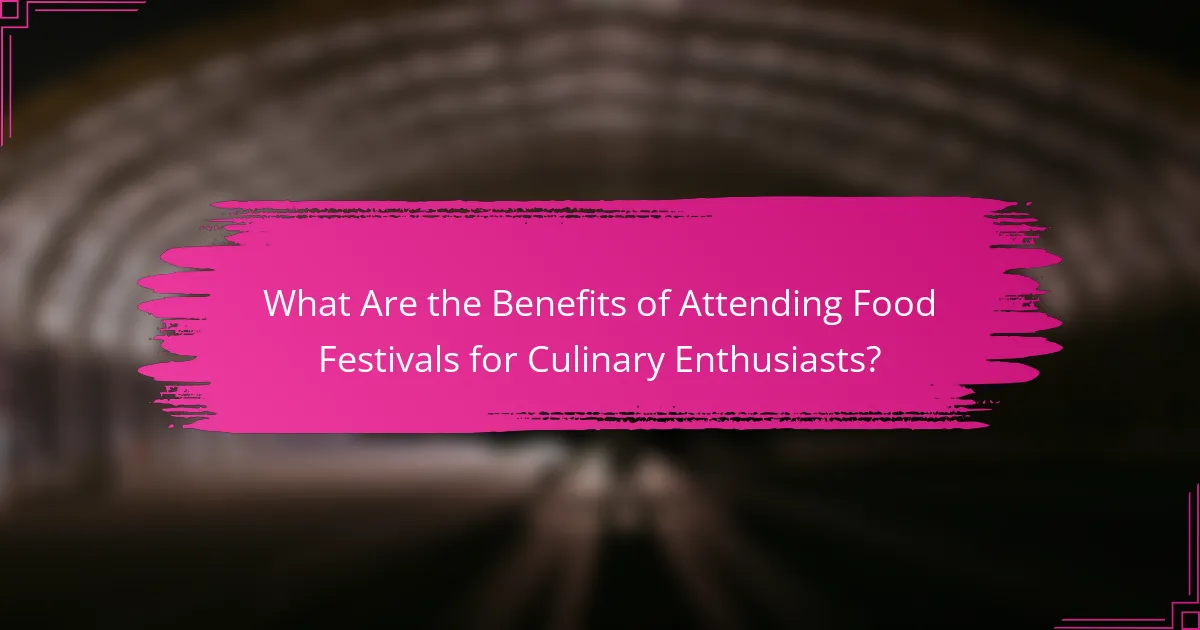Europe is a treasure trove of food festivals that celebrate its diverse culinary heritage and local flavors. These vibrant events offer food enthusiasts a chance to indulge in everything from traditional dishes to cutting-edge gastronomy, making each festival a unique experience. By considering your culinary interests and the festival’s location, you can immerse yourself in the rich tapestry of European gastronomy.

What Are the Best Food Festivals in Europe?
Europe hosts a variety of renowned food festivals that celebrate culinary traditions and local flavors. These festivals offer unique experiences for food enthusiasts, showcasing everything from traditional dishes to innovative gastronomy.
Oktoberfest in Munich
Oktoberfest, held annually in Munich, Germany, is the world’s largest beer festival, attracting millions of visitors. While primarily known for its beer, the festival also features a wide array of traditional Bavarian foods such as pretzels, sausages, and roast chicken.
Visitors should plan to arrive early to secure a spot in one of the large beer tents, as they can fill up quickly. Expect to spend around €10-€15 for a meal and €10 for a liter of beer.
La Tomatina in Buñol
La Tomatina is a unique food festival held in Buñol, Spain, where participants engage in a massive tomato fight. This event takes place on the last Wednesday of August and attracts thousands of enthusiastic participants ready to throw ripe tomatoes at each other.
While the focus is on fun rather than food consumption, local vendors offer traditional Spanish dishes nearby. It’s advisable to wear old clothes and arrive early to enjoy the festivities leading up to the main event.
Gourmet Festival in Berlin
The Gourmet Festival in Berlin showcases high-end culinary creations from top chefs and restaurants. Typically held in late summer, this festival features tastings, cooking demonstrations, and workshops focusing on gourmet cuisine.
Attendees can expect to sample a variety of dishes, often paired with fine wines. Tickets usually range from €30-€100, depending on the events and tastings included.
Salon du Chocolat in Paris
Salon du Chocolat is a paradise for chocolate lovers, taking place annually in Paris. This festival celebrates all things chocolate, featuring tastings, workshops, and competitions among chocolatiers from around the world.
Visitors can explore a wide range of chocolate products and learn about the art of chocolate making. Entry tickets typically cost around €12, with special workshops available for an additional fee.
Fête de la Gastronomie in France
The Fête de la Gastronomie is a nationwide celebration of French cuisine, held in late September. This festival includes a variety of events such as food markets, cooking classes, and themed dinners across the country.
Participating restaurants and chefs often offer special menus highlighting regional specialties. It’s a great opportunity to experience the diversity of French gastronomy, with many events being free or low-cost to attend.

How to Choose the Right Food Festival in Europe?
Choosing the right food festival in Europe involves considering your culinary interests, the festival’s location, and its schedule. By focusing on these key aspects, you can ensure a rewarding experience that aligns with your tastes and travel plans.
Consider culinary themes
Culinary themes play a significant role in selecting a food festival. Some festivals focus on specific cuisines, such as Italian pasta or Spanish tapas, while others celebrate local ingredients or cooking techniques. Identifying your culinary preferences can help narrow down your options.
For example, if you are passionate about seafood, look for festivals in coastal regions like the Algarve in Portugal or the seafood festivals in France. Alternatively, if you enjoy street food, events in cities like Berlin or London often showcase diverse culinary offerings.
Evaluate location and accessibility
The location of a food festival is crucial for convenience and enjoyment. Consider how easy it is to reach the festival site, whether by public transport or car. Festivals in major cities like Paris or Barcelona typically offer better accessibility, while rural festivals may require more planning.
Additionally, check for nearby accommodations and attractions. A festival in a picturesque town can provide a full travel experience, combining culinary delights with sightseeing opportunities. Ensure that the location aligns with your travel itinerary to maximize your visit.
Check festival dates and duration
Festival dates and duration are essential factors to consider when planning your visit. Many food festivals occur during specific seasons or months, often coinciding with local harvests or holidays. Research the timing to ensure it fits your schedule.
Most festivals last a few days to a week, allowing ample time to explore various offerings. However, some may be one-day events, so verify the duration to avoid missing out. Booking in advance can also help secure accommodations and tickets, especially for popular festivals.

What Are the Culinary Highlights of European Food Festivals?
European food festivals showcase a rich tapestry of culinary highlights, emphasizing local flavors, innovative techniques, and exquisite pairings. These events provide a unique opportunity for culinary enthusiasts to explore diverse gastronomic traditions and contemporary trends across the continent.
Local specialties and traditional dishes
Local specialties and traditional dishes are at the heart of European food festivals, often reflecting the region’s history and culture. For instance, Italy’s pasta varieties, France’s cheeses, and Spain’s tapas offer visitors a taste of authentic regional cuisine.
Attendees can expect to find dishes made from locally sourced ingredients, which not only support local farmers but also enhance the freshness and flavor of the food. Festivals often feature cooking demonstrations where chefs share the secrets behind these traditional recipes.
Innovative culinary techniques
Innovative culinary techniques are increasingly prominent at European food festivals, where chefs experiment with modern methods such as molecular gastronomy and sous-vide cooking. These techniques allow for unique textures and flavors that can transform traditional dishes into extraordinary experiences.
Visitors can participate in workshops or tastings that highlight these advancements, gaining insights into how technology and creativity are reshaping the culinary landscape. Engaging with chefs and food artisans provides a deeper understanding of the artistry involved in contemporary cooking.
Food pairing and wine tasting
Food pairing and wine tasting are essential components of many European food festivals, emphasizing the harmony between dishes and beverages. Regions like Bordeaux in France and Tuscany in Italy are renowned for their wine, which is often paired with local cuisine to enhance the dining experience.
Festival-goers can attend guided tastings that explore the principles of pairing, learning how flavors interact and complement each other. It’s beneficial to consider local wines when sampling regional dishes, as this can elevate the overall enjoyment of the meal.

What Are the Costs Associated with Attending Food Festivals in Europe?
Attending food festivals in Europe can involve various costs, including ticket prices, accommodation, travel, and food expenses. Understanding these costs can help culinary enthusiasts budget effectively for their festival experience.
Ticket prices and entry fees
Ticket prices for food festivals in Europe can vary widely, typically ranging from €5 to €50 depending on the event’s scale and location. Some festivals may offer free entry, while others charge for special access or tastings.
It’s advisable to purchase tickets in advance, as many festivals offer early-bird discounts. Additionally, consider checking if there are group rates available, which can help reduce costs for larger parties.
Accommodation and travel expenses
Accommodation costs can significantly impact your overall budget when attending a food festival. Prices for hotels or hostels can range from €30 to over €150 per night, depending on the city and proximity to the festival venue.
Travel expenses will vary based on your starting location. If you’re traveling within Europe, budget airlines or trains can offer affordable options, often costing between €20 and €100 for round trips. Booking transportation early can lead to better deals.
Food and beverage costs
Food and beverage costs at festivals can add up quickly, with individual dishes typically priced between €5 and €15. It’s common for festivals to feature a variety of vendors, allowing you to sample different cuisines.
Consider setting a daily budget for food and drinks to manage expenses. Some festivals may offer tasting packages or meal deals that provide better value, so look out for those options to maximize your culinary experience.

What Are the Benefits of Attending Food Festivals for Culinary Enthusiasts?
Attending food festivals offers culinary enthusiasts unique opportunities to immerse themselves in diverse cuisines, connect with industry professionals, and discover the latest trends in the culinary world. These events not only enhance knowledge but also provide a platform for networking and inspiration.
Networking opportunities with chefs
Food festivals are prime venues for culinary enthusiasts to meet chefs from various backgrounds and specialties. Engaging with these professionals can lead to mentorship opportunities, collaborations, or even job offers in the culinary field.
Participants can attend cooking demonstrations, panel discussions, and meet-and-greet sessions, allowing for direct interaction with chefs. This personal connection can be invaluable for aspiring chefs or food entrepreneurs looking to establish themselves in the industry.
Learning about new culinary trends
Food festivals showcase the latest culinary trends, from innovative cooking techniques to emerging ingredients. Attendees can sample dishes that highlight these trends, gaining firsthand experience of what’s popular in the culinary scene.
Workshops and tastings often feature cutting-edge concepts such as plant-based cuisine, sustainable sourcing, and fusion dishes. By participating, culinary enthusiasts can stay ahead of the curve and incorporate new ideas into their own cooking practices.
